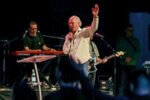God calls His New Covenant people “vessels of mercy.” This is a glorious part of who we are and what we have received from the Most High God.
Here’s the reference:
“What if God, willing to show His wrath and to make His power known, endured with much patience the vessels of wrath prepared for destruction, in order to make known the riches of His glory on the vessels of mercy, which He previously prepared for glory” (Rom. 9:22-23).
These two verses clearly reveal there are only two kinds of people in this world: vessels of wrath and vessels of mercy. All human beings fall under one category or the other.
A vessel is an object purposefully created to be filled with some kind of substance. There are many kinds of vessels in our homes: cans, pots, pans, bowls, glasses, cups and so on—each with its own specific function. In like manner, human beings are vessels—created with the unique spiritual capacity of being “filled”—and a unique purpose.
Some choose to be filled with dark, sinful tendencies—like rebellion, lust, anger and selfishness. Others seek to be filled with the nature of God—love, joy, peace, wisdom and grace. Our highest passion, though, should be an infilling, not just of godlike traits, but of God Himself, His personal presence. Only then can we fulfill the divinely authored design for our lives. But what happens when there have been deep failures preventing the fulfillment of the divine purpose? That’s when mercy shines through like a beacon in the night.
What Is Mercy?
Mercy is compassion shown especially to offenders or those of criminal behavior. It is pity extended toward the guilty, even though judgment is deserved. It can also be sympathetic care expressed toward those who are hurting, challenged or damaged in some way.
Mercy is a dominant character trait in the personality of God, who identified that characteristic first in describing Himself to Moses, saying—”The Lord, the Lord God, merciful and gracious … keeping mercy for thousands” (Ex. 34:6b-7a).
During that Old Covenant era, God also gave the design for something called “the tabernacle”: a humble, tent-like structure where the divine presence resided, and where God’s people came to worship and seek His favor. The tabernacle had three chambers: the outer court, the holy place and the holy of holies. In the innermost chamber was the ark of the covenant.
The two tablets of stone on which God wrote the Ten Commandments were in the ark, as well as the book of the Law. This revelation (the Torah) was later called “the ministry of condemnation” and “the ministry of death,” because of the serious judgments pronounced on those who failed to live up to its standard (2 Cor. 3:7-9).
The Mystery of the Mercy Seat
There was one thing that was positioned higher than the Law, thankfully, and that was the lid of the ark—also called “the mercy seat” (Ex. 25:17). No man ever sat there, but on the lid, between the cherubim, God’s glory rested. The blood of a goat was sprinkled on it one time a year, on the Day of Atonement (Yom Kippur), lifting the sin-debt of the Israelite people.
The mercy seat was God’s representative throne on earth—a revelation of His heart—that on the highest level His desire was to be, not just a stern judge executing retribution toward those who break His law, but “the Father of mercies” toward erring human beings who appeal to Him for forgiveness (2 Cor. 1:3).
There is a mystery concerning the mercy seat that can only be discovered by going to the original Greek. The phrase “mercy seat” is only found one time in the New Testament—Hebrews 9:5—translated from one Greek word hilasterion. How intriguing it is that hilasterion is also translated “propitiation” in Romans 3:25 as a description of the Lord Jesus:
“Being justified freely by His grace through the redemption that is in Christ Jesus, whom God has set forth to be a propitiation through faith, in His blood” (Rom. 3:24-25a).
The word “propitiation” means satisfaction for the demands of justice. So, Jesus is our hilasterion. He is our propitiation. He is our mercy seat. He satisfied the demands of justice. And for those who claim His salvation, “mercy triumphs over judgment” (James 2:13b). Thank God!
The Main Requirement
The primary attitude that attracts the mercy of God is the fear of the Lord. This is not a crippling kind of fleshly fear, but a deep reverential awe toward the Creator. It is the highest expression of respect for God’s highness, God’s holiness, God’s authority and God’s majesty. Those who cultivate this attitude toward God are given wonderful promises, such as:
“For as the heavens are high above the earth, so great is His mercy toward those who fear Him” (Ps. 103:11).
Consider just how high “the heavens” must be. Scripture teaches there are three heavens (2 Cor. 12:2-4). The first heaven is probably the atmosphere around the earth and the physical universe beyond. The second heaven is most likely a higher, intermediate spiritual realm filled with angelic and demonic activity. The third heaven, called paradise, is the highest realm, the dwelling place of God, where His glory manifests. I would dare to propose that the third heaven is incalculable in size. Six verses later we find another great promise:
“But the mercy of the LORD is from everlasting to everlasting upon those who fear Him” (Ps. 103:17a).
So from eternity past to eternity future, there is no limit to the amount of mercy available for those who reverence God to the highest degree. It weaves its way through all the negatives of the past and in advance, through all the challenges of the future—even death itself.
“Let us therefore come boldly to the throne of grace, that we may obtain mercy and find grace to help in time of need” (Heb. 4:16, NKJV).
Yes, we are “vessels of mercy”—this is who we are for time and eternity! {eoa}
Mike Shreve has taught on the spiritual identity of believers for over 30 years. This powerful revelation is the central theme of his Charisma House book titled WHO AM I? Dynamic Declarations of Who You Are in Christ. It is also featured on his weekly podcast on cpnshows.com titled Discover Your Spiritual Identity and his YouTube channel: YouTube.com/mikeshreveministries. A product of the Jesus Movement era, Mike has traveled evangelistically in the United States and overseas since 1970 with an emphasis on healing and the prophetic. To go deeper into this revelation of our calling to be “Vessels of Mercy,” listen to Episode 31 of Mike Shreve’s podcast, titled Discover Your Spiritual Identity.
Read articles like this one and other Spirit-led content in our new platform, CHARISMA PLUS.







Leave a Comment
You must be logged in to post a comment.